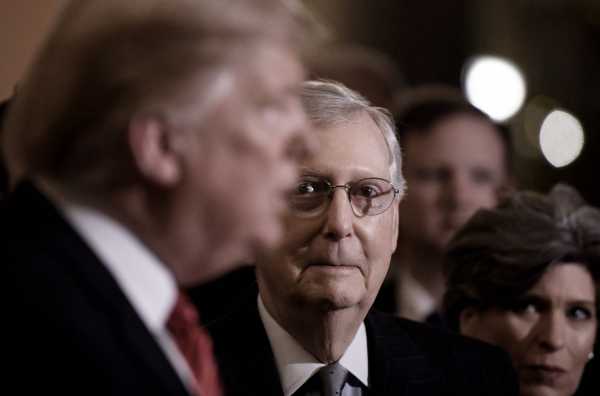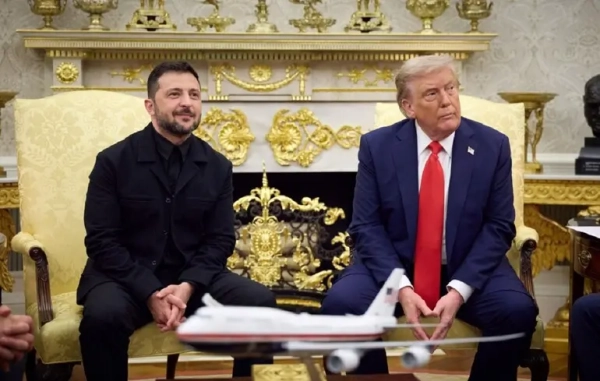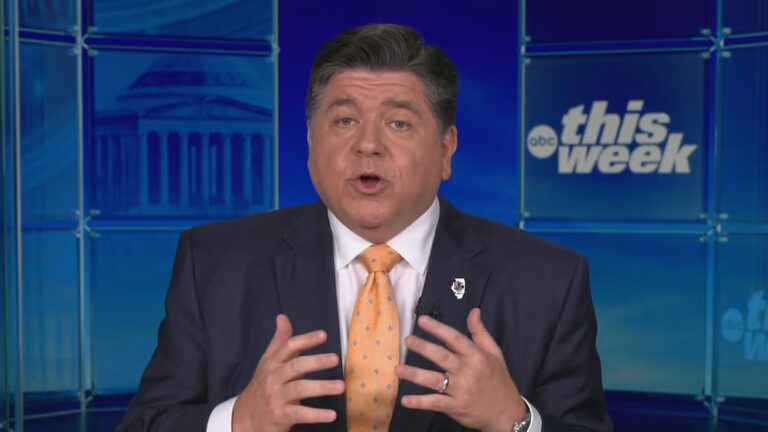
Senate Majority Leader Mitch McConnell is no fan of government shutdowns.
“Remember me? I am the guy that gets us out of shutdowns,” he said in a 2014 CNN interview. “It’s a failed policy.”
“Let me make it clear: There will be no government shutdowns,” he reiterated later that year.
And yet, here we are.
While McConnell got the Senate to vote unanimously to fund the government in December, Trump went on to change his mind, threatening a veto that pushed the government into the current impasse.
“Now that the president has put Republicans in a bad spot, McConnell is doing his best to shield them from the shutdown fallout,” said Josh Huder, a senior fellow at Georgetown’s Government Affairs Institute, who previously worked with Democrats on the Hill. “Basically, McConnell won’t play offense because he is busy playing defense.”
As outcry over the partial shutdown has grown, McConnell has been content to keep the attention turned to Trump, as well as House Speaker Nancy Pelosi and Senate Minority Leader Chuck Schumer. By broadly keeping Senate Republicans out of the shutdown conversation, McConnell is ensuring that they dodge the blame.
“Ultimately the solution to this is a deal between the President and Nancy and Chuck because we need some of Chuck’s votes and obviously we need Nancy’s support,” McConnell told CNN. “I haven’t been sidelined. … It’s just that there’s no particular role for me when you have this setup.”
McConnell’s decision to have Trump take the lead (at least publicly) on shutdown talks might seem like a passive move, but it’s also a strategic one that’s enabled Senate Republicans to emerge from this stalemate relatively scot-free.
A Politico/Morning Consult poll this week found that Trump was shouldering the lion’s share of the blame, with 49 percent of respondents holding him responsible and just 4 percent blaming congressional Republicans.
McConnell isn’t exactly a natural counterpart for Trump — he’s called their differences “obvious” — but he certainly has a role to play in this government shutdown, now the longest in US history by a wide margin. This dynamic has put him in an awkward position.
As McConnell admitted to the New York Times’s Charles Homans: “I’m perplexed as to how this ends.”
How we got here
In an attempt to avoid this very situation, McConnell had the Senate unanimously pass a short-term spending bill that did not include wall money last December.
“We’ve been down this path before, and I don’t believe we’ll go down this path again,” McConnell told reporters at the time, according to the Washington Post’s Erica Werner and David Weigel. They continued:
When Trump unexpectedly refused to sign the clean spending bill after getting pressure from conservative House members Jim Jordan and Mark Meadows — it was clear he’d left McConnell high and dry.
Trump’s reversal left McConnell scrambling to maintain his alignment with the president, and supporting a shutdown that he didn’t really want to happen in the first place.
“He got burned by Trump, and he doesn’t want to get burned again,” said Jim Manley, who worked under former Senate Minority Leader Harry Reid.
McConnell has scheduled a set of Thursday Senate votes on two proposals, one from Trump, and one from Democrats. Both are expected to fail.
The generous read is that he’s finally doing something about the shutdown; the more cynical one is that he’s going to show the world that both sides have an untenable position — forcing Democrats to give up their “clean vote” position.
#WheresMitch: McConnell has kept a very low profile
McConnell’s low profile during shutdown negotiations was so noticeable that it became a bit of a punchline.
“The idea that McConnell is showing leadership here is an absolute joke. He has been and continues to be MIA,” Manley said. “Last time I checked, Congress is a co-equal part of government with a significant amount of say over federal spending.”
During a Rose Garden press conference in early January, McConnell’s absence from the debate was especially conspicuous. Even though he attended a White House meeting with Trump alongside other Congressional leaders, McConnell left early and didn’t go to the press briefing, something his aides later said he would have stayed for had he known about it.
A few weeks later, Democratic rising star Rep. Alexandria Ocasio-Cortez (D-NY) raised questions about McConnell’s involvement as well, kicking off a social media campaign pointedly asking #WheresMitch.
Ocasio-Cortez and other first-term representatives including Lauren Underwood (D-IL) and Katie Hill (D-CA) sought to physically find McConnell at the Capitol and confront him about his inaction on the shutdown. When they weren’t able to track him down, Ocasio-Cortez documented much of the search on Twitter.
That hashtag has since taken on a life of its own.
Until this week, McConnell had resolutely refused to consider any of the spending bills the House passed to reopen the government, arguing that none had the support they needed from the president.
“If the president won’t sign something, it doesn’t make sense to try and move it, right?” a McConnell spokesperson said of the Senate leader’s rationale.
Crossing Trump could have major consequences for Republicans
McConnell’s unwillingness to let Senate Republicans cross Trump underscores the consequences for Republicans if they break with the president.
A pocket of vulnerable Senate Republican up for re-election in 2020 — Sens. Cory Gardner (CO) and Susan Collins (ME) — could be feeling the heat, but it’s broadly in Republicans’ best interest to stick with the president, who’s still very popular in many GOP-held states.
A canvassing of over forty Republican senators and aides by the Washington Post’s Seung Min Kim and Sean Sullivan found that most were united in their support of Trump as a result.
Not only would a public break with Trump increase the threat of a potential 2020 primary challenge for various Republican senators, it also would be counter to many Republicans’ actual stances on the issue of border security.
After all, while many of them may not be excited about a wall, per se, the majority of Republicans have long pushed for more aggressive border security measures and are technically on the same page with the president on this particular issue.
Even if Americans may broadly oppose the shutdown, Republicans’ support of the wall has actually hardened in recent months.
The concern about 2020 primary challengers looms large for many Republicans, including McConnell, who himself will be up for reelection in the next cycle. While McConnell isn’t particularly popular in Kentucky (his approval ratings clock in at a dismal 38 percent), political experts don’t see a particular risk for him. Trump’s approval rating in the state was more than 15 percentage points higher as of December 2018, however.
Thursday’s upcoming votes could give McConnell a way to spur movement on the shutdown
The results of this Thursday’s votes will ultimately send a message to both Trump and the Democrats.
If Trump’s proposal fails, as it’s expected to, that vote will show the president there isn’t enough support for his full ask on the wall. If the Democratic option fails, as it is also expected to, it would send a message that Democrats have to give Trump something.
McConnell has known that the numbers weren’t there for the Democrats’ bills and that’s why he hasn’t taken them up, said Trey Grayson, a former Kentucky Secretary of State and longtime ally. Although many Republicans backed a clean spending bill last December, the president’s threat to veto the bill has changed their calculus completely.
The votes on Thursday are a classic embodiment of what Vox’s Dylan Scott has noted is McConnell’s “show them a body” strategy — or an effort to take votes that are destined to fail — which won’t necessarily end the stalemate, but could help spur new movement around it.
“It looks to me like he’s taken a playbook out of previous House leaders like Boehner and Ryan, calling for a vote knowing that both are going to fail to show everyone involved that the votes aren’t there and we need another plan,” says Manley of the Thursday votes.
Sourse: vox.com






